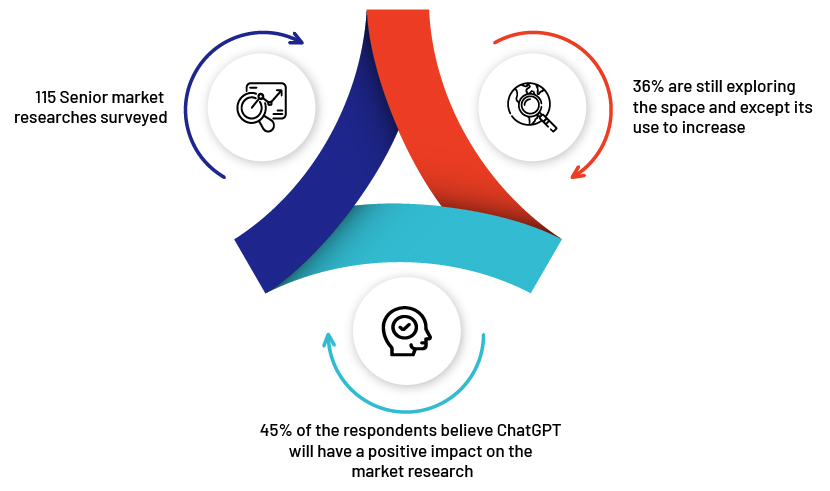Published on February 14, 2023 by Abhishek Bhatia
Since its launch in November 2022, OpenAI’s ChatGPT has taken the world by storm. It breached 1 million users within one week of its launch – a record. Unsurprisingly, every sector is scrutinising the advantages this conversational artificial intelligence (AI) tool can bring to its business.
Let’s explore ChatGPT and how it can revolutionise the market research industry.
What is ChatGPT
ChatGPT (Chat Generative Pre-trained Transformer) is a large language model trained on a massive collection of text data. It combines NLP (natural language processing) and machine learning to generate human-like text, keep track of the context and provide relevant information based on the input received.
ChatGPT uses the primary techniques of deep learning, which include supervised learning and reinforced learning from human feedback. This enables the tool to analyse and use a user’s previous response to generate its next response.
OpenAI’s explanation of ChatGPT methodology

The goal of ChatGPT is to provide a conversational AI system that can generate informative, engaging and contextually relevant text.
ChatGPT for market analysis
ChatGPT, given its ability to understand the context and provide relevant information, could prove to be a valuable resource to collect, analyse and understand market trends. Some key benefits of the tool are its ability to streamline existing processes, collect qualitative data through conversational surveys, analyse and extract information from large amounts of unstructured data and provide valuable market intelligence, and save significant time and effort of researchers.
Acuity Knowledge Partners recently surveyed 115 senior market researchers globally on ChatGPT and its implications in the market research industry. 45% respondents said ChatGPT would have a deep positive impact on the industry, while 36% were currently exploring and following up on ChatGPT, but they expected its use to increase in the coming years. Survey findings also revealed ChatGPT should influence market research. But many aspects need to be factored to make traditional market research more effective. We expect an increasing number of market research companies to explore ChatGPT and how positively it may affect their market research processes.

Use cases of ChatGPT for market analysis
Some common use cases of ChatGPT for market analysis are as follows:
-
Chatbot surveys: ChatGPT can be used to develop conversational and smart surveys for gathering customer feedback and insights. This allows for more natural and engaging data collection compared to traditional surveys.
-
Customer segmentation: ChatGPT can be used to categorise customer data based on the responses.
-
Trend analysis: ChatGPT can be used to analyse large amounts of customer feedback, social media posts and other unstructured data sources to identify trends in customer sentiment and behaviour.
-
Sentiment analysis: ChatGPT can be used to analyse customer feedback and determine the overall sentiment towards a brand, product or service, providing valuable insights into market research and customer relationship management.
-
Text classification: ChatGPT can be used to categorise customer feedback and other unstructured data by specific themes, such as product features, customer service and marketing efforts, improving the analysis and understanding of customer needs and preferences.
-
Customer service: ChatGPT can be integrated into customer service chatbots, providing a more personalised and engaging customer support experience while gathering valuable customer feedback and insights.
Applications in market research
ChatGPT has numerous applications in market research (both quantitative and qualitative).
Applications in quantitative research
Text data analysis: ChatGPT can process and analyse large amounts of text data, such as customer reviews or survey responses, to help gain insights into patterns and trends.
NLP tasks: It can perform NLP tasks, such as text classification, sentiment analysis and entity extraction, to support quantitative research.
Data augmentation: The tool can generate synthetic data to supplement limited data sets in quantitative research.
Predictive modelling: ChatGPT can be used as a feature in predictive models, such as time series forecasting or classification models, to improve the accuracy of forecasts.
Data summarisation: It can summarise long texts, such as research papers, news articles or reports, thereby assisting researchers in quickly gaining insights from large amounts of information.
Applications in qualitative research
Open-ended surveys: ChatGPT can be used to design and conduct open-ended surveys. It can then analyse and categorise the responses, providing valuable insights into customer attitudes, opinions and preferences.
Focus groups: It can be integrated into virtual focus groups, where customers can participate in real-time, text-based discussions on products, services or experiences. It can then analyse and categorise a discussion, providing valuable insights into customer opinions and feedback.
In-depth interviews: The tool can be used to conduct in-depth interviews with customers, where open-ended questions are asked to gather in-depth feedback and insights. It can then analyse and categorise the responses, providing valuable insights into customer attitudes, opinions and preferences.
Social media analysis: ChatGPT can be used to analyse and categorise customer feedback and opinions on social media, providing valuable insights into customer sentiment and behaviour.
Customer feedback analysis: It can be used to analyse customer feedback and categorise it into specific themes, such as product features, customer service and marketing efforts, providing valuable insights into customer needs and preferences.
Content analysis: ChatGPT can be used to analyse large amounts of unstructured data, such as customer feedback and customer service logs, providing valuable insights into customer attitudes, opinions and preferences.
Limitations of ChatGPT
ChatGPT has the potential to improve the market research processes exponentially. Having said that, it would be sensible to understand its pitfalls, which include the following:
Lack of expertise: The model does not have specialised knowledge in market research and may not always provide accurate information.
Limited data: It has been trained on a limited amount of market research data and may not always provide up-to-date information.
Contextual issues: ChatGPT may struggle to understand the nuances and complexities of market research and the industries being researched.
Bias: The tool has been trained on a corpus of text that may contain biases and stereotypes, which can influence its answers in market research.
Lack of interpretation: The model can provide data-driven answers, but it lacks the ability to interpret or provide strategic recommendations based on the data.
Ethical concerns: There are ethical concerns around the use of AI models in market research, such as privacy and data security, that need to be addressed before ChatGPT can be used for market research.
Lack of symbol-representation system: The language model lacks a symbol-representation system, leading to the possibility that it would mistake and manipulate symbols as language instead of their own symbolic meaning, potentially leading to arithmetic mistakes.
Conclusion
In conclusion, ChatGPT is all set to revolutionise the way market research is conducted. As this technology evolves and matures, it will likely become an increasingly lethal weapon for market research companies looking to gain a competitive edge.
However, ChatGPT is not a substitute for human expertise and creativity. Thus, researchers need to take a more holistic approach and ensure its conjunction with human interpretations and other tools to make more informed decisions and gain better insights.
How Acuity Knowledge Partners can help
As a leading provider of high-value research, analytics and business intelligence, Acuity Knowledge Partners offers a full suite of market research consulting services. We started using AI in survey analytics to extract sentiments and deep dive into digital conversations using social media and verbatim survey responses. We plan to take significant strides in this space and follow a well-researched approach founded on our two decades of experience in the market research domain.
Sources
-
ChatGPT: Optimizing Language Models for Dialogue (openai.com)
-
The future of market research is here: Introducing ChatGPT (audiense.com)
-
ChatGPT Statistics for 2023: Comprehensive Facts and Data (demandsage.com)
Tags:
What's your view?
About the Author
Abhishek is an Associate Director with Acuity Knowledge Partners (Acuity) and has over 19 years of experience in market research, consulting and data analytics. He is an expert in primary research and project management. Abhishek is an active contributor to the primary research fraternity and has been awarded as Research Hero for 2023 by the prestigious Market Research Society. Abhishek leads multiple large client engagements and is instrumental in setting up Acuity’s primary research business
Like the way we think?
Next time we post something new, we'll send it to your inbox








